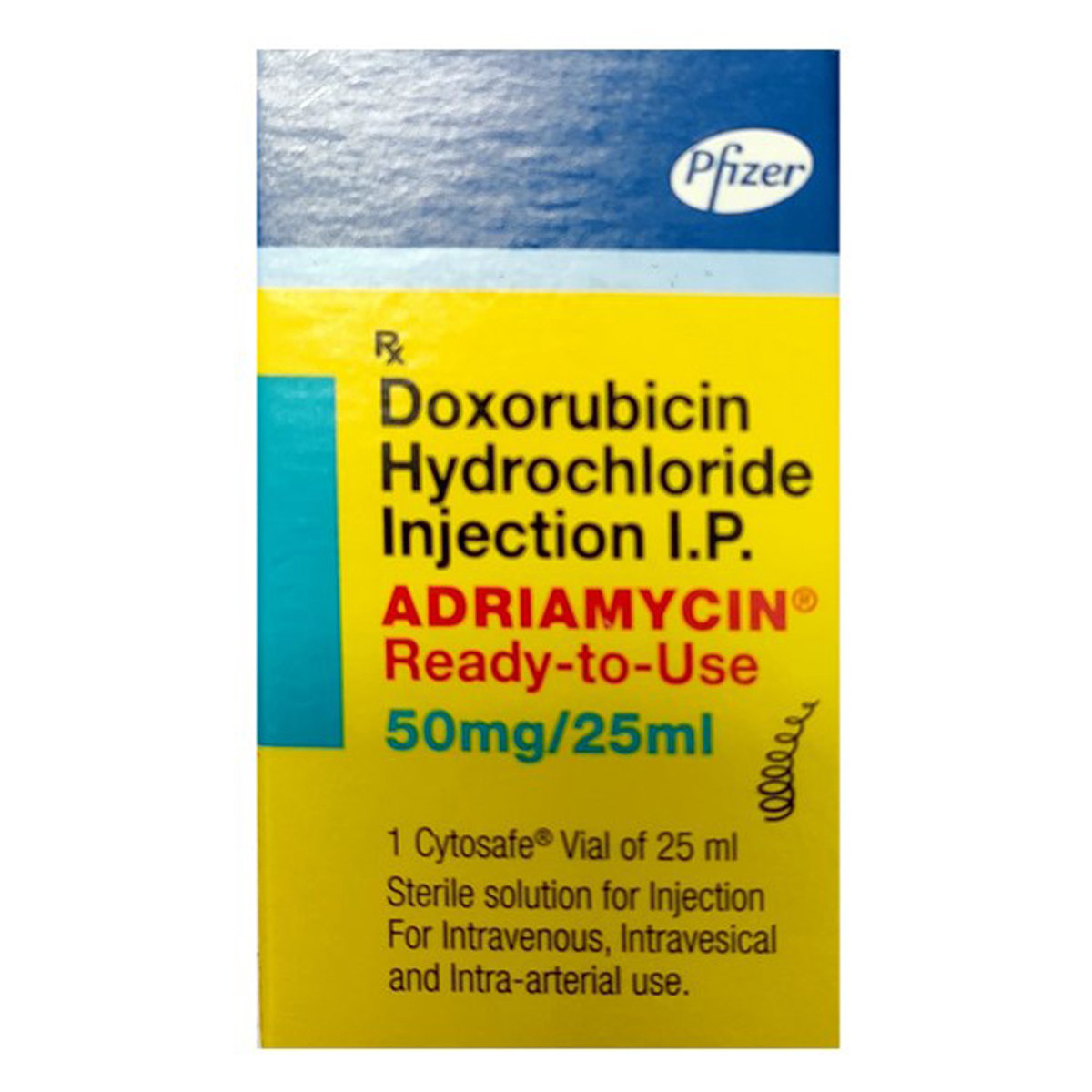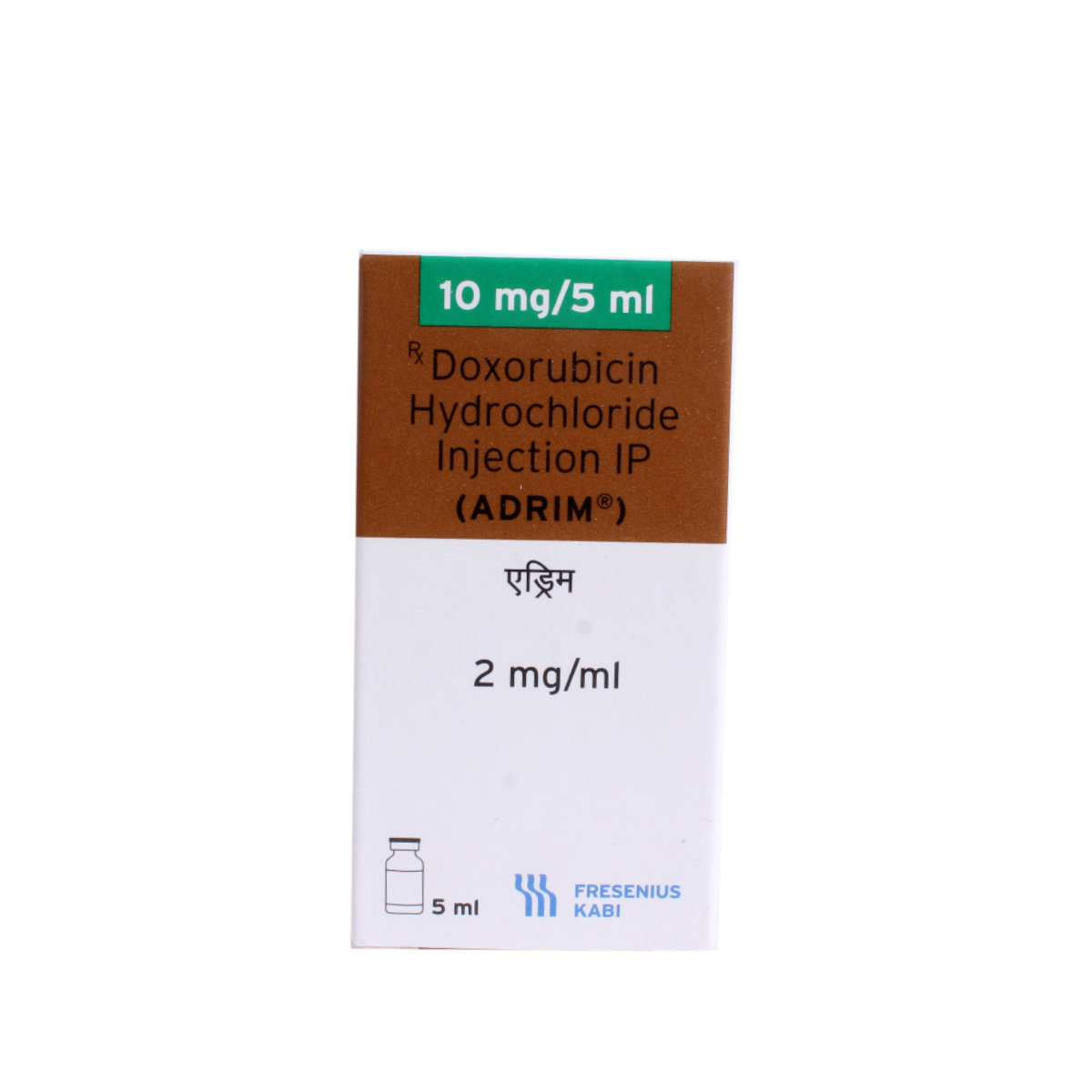Doxorubicin Hydrochloride Pegylated Liposome
About Doxorubicin Hydrochloride Pegylated Liposome
Doxorubicin Hydrochloride Pegylated Liposome is an anti-cancer medicine used to treat ovarian cancer, AIDS-related Kaposi's sarcoma, and multiple myeloma. Cancer is a disease in which cells grow and divide in an abnormal and uncontrolled manner. Ovarian cancer occurs when abnormal cells grow in the ovaries. Kaposi sarcoma is a type of cancer that causes abnormal tissue growths (lesions) in the skin, lymph nodes, or the lining of the digestive tract. AIDS-related Kaposi sarcoma occurs in people infected with the HIV (Human Immunodeficiency Virus). Multiple myeloma is a type of cancer affecting the bone marrow.
Doxorubicin Hydrochloride Pegylated Liposome contains Doxorubicin hydrochloride pegylated liposome, which works by inhibiting an enzyme called topoisomerase 2 required by the cancer cells for DNA synthesis. This prevents the cancer cells from making the new genetic material necessary for their growth and division. Thereby, Doxorubicin Hydrochloride Pegylated Liposome helps treat cancer.
A trained healthcare doctor will administer Doxorubicin Hydrochloride Pegylated Liposome; so, do not self-administer it. Your doctor will decide the appropriate dose of this medicine based on your health condition. Doxorubicin Hydrochloride Pegylated Liposome may cause common side effects, such as nausea, headache, stomach pain, loss of appetite, vomiting, mouth sores, tiredness, back pain, orange or red discoloration of urine, hair loss, diarrhoea, dizziness, and pain at the injection site. Most of these side effects are generally mild and will gradually resolve over time. However, if these side effects persist or worsen, please consult your doctor.
Before receiving Doxorubicin Hydrochloride Pegylated Liposome, inform your doctor if you are allergic to any of its ingredients. Also, let your doctor know if you are taking any prescription or non-prescription medications, or herbal supplements before using Doxorubicin Hydrochloride Pegylated Liposome. Doxorubicin Hydrochloride Pegylated Liposome is not recommended during pregnancy and breastfeeding. Let your doctor know if you have any pre-existing medical conditions, such as severe heart or liver diseases, low white blood cell count, bone marrow suppression, or a history of heart attack. Doxorubicin Hydrochloride Pegylated Liposome may cause damage to the heart, potentially causing issues like heart failure. So, close monitoring of your vital signs and heart function is required before and during the treatment with Doxorubicin Hydrochloride Pegylated Liposome.
Uses of Doxorubicin Hydrochloride Pegylated Liposome
Medicinal Benefits
Doxorubicin Hydrochloride Pegylated Liposome is an anti-cancer medicine mainly used to treat ovarian cancer, Kaposi's sarcoma (a type of cancer that causes abnormal tissue growth on different body parts) related to AIDS (Acquired Immunodeficiency Syndrome), and multiple myeloma (a cancer of the bone marrow). It is also used to treat metastatic breast cancer in patients who are at risk of heart problems. It contains Doxorubicin hydrochloride pegylated liposome, which belongs to the class of anthracycline topoisomerase inhibitors. It inhibits an enzyme called topoisomerase 2, which cancer cells need for DNA synthesis. This prevents the cancer cells from making the new genetic material required for their growth and division. Thereby, Doxorubicin Hydrochloride Pegylated Liposome helps treat cancer.
Directions for Use
- Follow your doctor’s instructions on the dosage and timing of this medication to ensure safe and effective use.
- Doxorubicin Hydrochloride Pegylated Liposome will be administered by a healthcare professional in a medical setting.
- Do not self-administer.
Storage
Side Effects of Doxorubicin Hydrochloride Pegylated Liposome
- Nausea
- Headache
- Stomach pain
- Loss of appetite
- Vomiting
- Dizziness
- Mouth sores
- Tiredness
- Back pain
- Hair loss
- Orange or red discoloration of urine
- Diarrhoea
- Pain at the injection site
Drug Warnings
Before receiving Doxorubicin Hydrochloride Pegylated Liposome, inform your doctor if you are allergic to any of its ingredients. Also, let your doctor know if you are taking any prescription or non-prescription medications, or herbal supplements before using Doxorubicin Hydrochloride Pegylated Liposome. Doxorubicin Hydrochloride Pegylated Liposome is not recommended during pregnancy and breastfeeding. Let your doctor know if you have any pre-existing medical conditions, such as severe heart or liver diseases, low white blood cell count, bone marrow suppression, or a history of heart attack. Doxorubicin Hydrochloride Pegylated Liposome may cause damage to the heart, potentially causing issues like heart failure. So, close monitoring of your vital signs and heart function is required before and during the treatment with Doxorubicin Hydrochloride Pegylated Liposome. Doxorubicin Hydrochloride Pegylated Liposome may weaken your immune system, so let your doctor know if you notice any unusual bleeding or bruising or have signs of an infection like chills, fever, or body pains. Watch out for any signs of infusion-related reactions and promptly report related symptoms to your doctor, such as low blood pressure (hypotension), rash, bluish skin and nail colour (cyanosis), headache, chills, fever, swelling in the face, back pain, and shortness of breath. Seek medical attention if you experience symptoms of heart problems such as breathing difficulty, shortness of breath, irregular/pounding heartbeat, or swelling of hands or feet.
Drug Interactions
Drug-Drug Interactions: Inform the doctor if you are taking antiemetics (palonosetron, ondansetron, aprepitant), antipsychotics (prochlorperazine), steroid (dexamethasone), antineoplastic agent (docetaxel, paclitaxel), colony-stimulating factors (filgrastim, pegfilgrastim), or antidiarrhoeal agent (loperamide).
Drug-Food Interactions: No interactions have been established.
Drug-Disease Interactions: Inform your doctor if you have any pre-existing medical conditions, such as severe heart or liver diseases, low white blood cell count, bone marrow suppression, or a history of heart attack.
Drug-Drug Interactions Checker List:
Safety Advice

Alcohol
consult your doctorIt is not known whether alcohol interacts with Doxorubicin Hydrochloride Pegylated Liposome. Please consult your doctor before receiving Doxorubicin Hydrochloride Pegylated Liposome.

Pregnancy
unsafeDoxorubicin Hydrochloride Pegylated Liposome is not recommended for use in pregnancy, as it may harm your unborn baby. Therefore, if you are pregnant or planning to become pregnant, inform your doctor before receiving Doxorubicin Hydrochloride Pegylated Liposome.

Breast Feeding
unsafeIt is not recommended for use in breastfeeding. Therefore, if you are breastfeeding, inform your doctor before receiving Doxorubicin Hydrochloride Pegylated Liposome.

Driving
cautionDoxorubicin Hydrochloride Pegylated Liposome may cause dizziness and tiredness; therefore, avoid driving vehicles or operating machinery until you are fully alert.

Liver
cautionDoxorubicin Hydrochloride Pegylated Liposome should be used with caution in patients with liver impairment. If you have pre-existing liver diseases, inform your doctor. Your doctor may need to adjust the dose or prescribe a suitable alternative based on your health condition.

Kidney
cautionIf you have pre-existing kidney diseases, inform your doctor. Your doctor may need to adjust the dose or prescribe a suitable alternative based on your health condition.

Children
consult your doctorThe safety and effectiveness of Doxorubicin Hydrochloride Pegylated Liposome have not been established in children under 12 years. Therefore, consult your doctor if you have any concerns regarding this.
Habit Forming
Diet & Lifestyle Advise
- Include more lean meats, healthy fats, vegetables, fruits, and whole grains in your diet to give you more energy.
- Stay hydrated by drinking plenty of water, as dehydration is often seen in cancer treatments.
- Taking a stroll in the garden or engaging in some light physical activity for 30 minutes can be very useful.
- Meditation and yoga have been proven very effective in helping cancer patients maintain a healthy mindset and body.
- Avoid smoking and alcohol consumption.
Special Advise
- Complete blood and platelet counts and liver function should be checked regularly before receiving each dose during the treatment.
- Females of reproductive potential and males with partners of reproductive potential should use effective contraception during treatment and for 6 months after the last dose.
Patients Concern
Disease/Condition Glossary
Ovarian cancer: It occurs when abnormal cells grow in the ovaries, and it mostly affects women over 50 years. Common symptoms may include bloating or swelling in the abdomen, feeling full quickly when eating, weight loss, constipation, tiredness, back pain, pelvic discomfort, and frequent urination.
Kaposi sarcoma: It is a type of cancer that causes abnormal tissue growths (lesions) in the skin, lymph nodes, or the lining of the digestive tract (from mouth to the anus). It is more common in men and people with weakened immune systems. It often starts as red, brown, or purple lesions on the legs and feet. AIDS-related Kaposi sarcoma occurs in people infected with the HIV (Human Immunodeficiency Virus).
Multiple myeloma: It is a type of cancer that starts in a type of white blood cell called plasma cells, and these cells build up in the bone marrow over time. Symptoms may include bone pain, weight loss, thirst, tiredness, frequent infections, fever, and frequent urination.
FAQs
Doxorubicin Hydrochloride Pegylated Liposome is an anti-cancer medicine used to treat ovarian cancer, Kaposi's sarcoma (a type of cancer that causes abnormal tissue growth on different body parts) related to AIDS (Acquired Immunodeficiency Syndrome), and multiple myeloma (a cancer of the bone marrow).
Doxorubicin Hydrochloride Pegylated Liposome contains Doxorubicin hydrochloride pegylated liposome (an anthracycline topoisomerase inhibitor). It works by inhibiting an enzyme called topoisomerase 2, which cancer cells need for DNA synthesis. This prevents the cancer cells from making the new genetic material required for their growth and division. Thereby, Doxorubicin Hydrochloride Pegylated Liposome helps treat cancer.
The common side effects of Doxorubicin Hydrochloride Pegylated Liposome include nausea, headache, stomach pain, loss of appetite, vomiting, mouth sores, tiredness, back pain, orange or red discoloration of urine, hair loss, diarrhoea, dizziness, and pain at the injection site. Most of these side effects are generally mild and will resolve on their own over time. However, if you experience persistent, severe, or worsening side effects, please consult your doctor.
Doxorubicin Hydrochloride Pegylated Liposome is not recommended for use in pregnant women as it may harm the unborn baby. Therefore, if you are pregnant, think you may be pregnant or planning to become pregnant, inform your doctor before receiving Doxorubicin Hydrochloride Pegylated Liposome.
Doxorubicin Hydrochloride Pegylated Liposome is not recommended for use in breastfeeding women, as it may pass into breast milk and harm your baby. Therefore, if you are breastfeeding, inform your doctor before receiving Doxorubicin Hydrochloride Pegylated Liposome.
Doxorubicin Hydrochloride Pegylated Liposome may cause temporary or permanent infertility by affecting periods in women and sperm count in men. Therefore, consult a doctor if you are planning to become pregnant or father a child.




